 Technology peripherals
Technology peripherals
 AI
AI
 The diffusion model generates images with Chinese characters and outputs emoticons with one click: OPPO and others proposed GlyphDraw
The diffusion model generates images with Chinese characters and outputs emoticons with one click: OPPO and others proposed GlyphDraw
The diffusion model generates images with Chinese characters and outputs emoticons with one click: OPPO and others proposed GlyphDraw
Recently, many unexpected breakthroughs have been made in the field of text-generated images, and many models can achieve the function of creating high-quality and diverse images based on text instructions. While the images generated are already very realistic, current models are often good at generating images of physical objects such as landscapes and objects, but struggle to generate images with a high degree of coherent detail, such as images with complex glyph text such as Chinese characters.
In order to solve this problem, researchers from OPPO and other institutions have proposed a general learning framework GlyphDraw, which is designed to enable the model to generate images embedded with coherent text. This is the field of image synthesis. The first work to solve the problem of Chinese character generation.
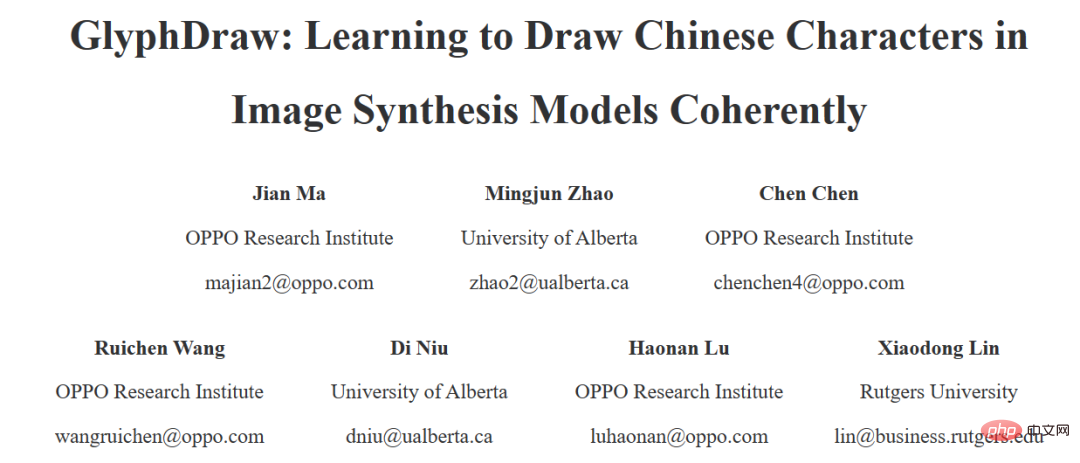
- ##Paper address: https://arxiv.org/abs/2303.17870
- Project homepage: https://1073521013.github.io/glyph-draw.github.io/
Let’s start with Let’s take a look at the generation effect, for example, generating warning slogans for the exhibition hall:
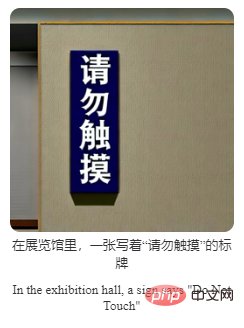
Generating billboards:
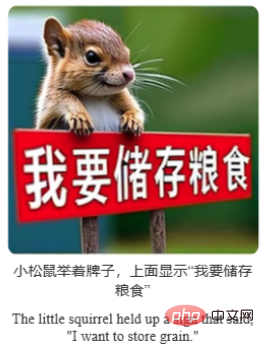
Add a brief text description to the picture. The text style can also be diverse:

Also, the most interesting and practical example is to generate emoticons:

Although the result has some flaws , but the overall generation effect is already very good. Overall, the main contributions of this research include:
- This research proposes the first Chinese character image generation framework GlyphDraw, which utilizes some Auxiliary information, including Chinese character glyphs and positions, provides fine-grained guidance throughout the generation process, allowing Chinese character images to be seamlessly embedded into images with high quality;
- This study proposes an effective The training strategy limits the number of trainable parameters in the pre-trained model to prevent overfitting and catastrophic forgetting, effectively maintaining the model's powerful open domain generation performance while achieving accurate Chinese character image generation. .
- This study introduces the construction process of the training dataset and proposes a new benchmark to evaluate the quality of Chinese character image generation using OCR models. Among them, GlyphDraw achieved a generation accuracy of 75%, significantly better than previous image synthesis methods.
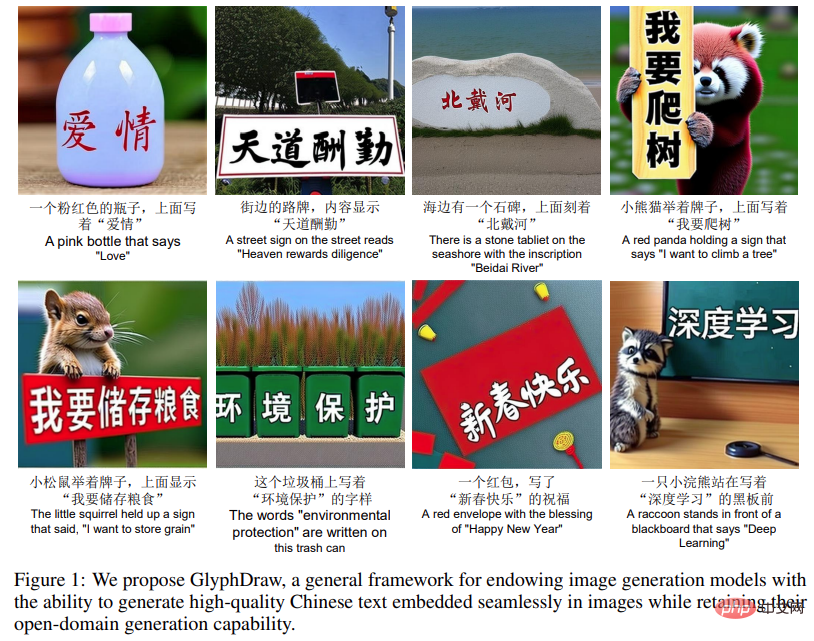
The study first designed a complex image-text data set Build a strategy, and then propose a general learning framework GlyphDraw based on the open source image synthesis algorithm Stable Diffusion, as shown in Figure 2 below.
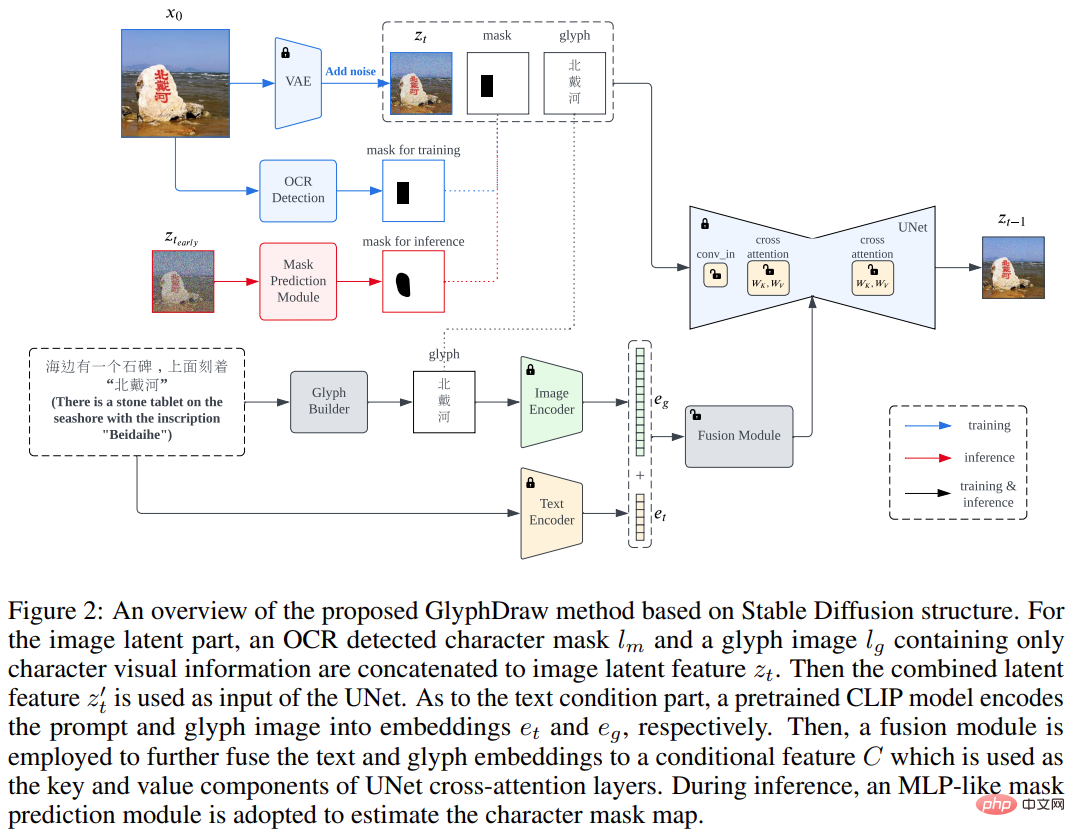
The overall training goal of Stable Diffusion can be expressed as the following formula:

GlyphDraw is based on the cross-attention mechanism in Stable Diffusion, where the original input latent vector z_t is replaced by a concatenation of the image latent vector z_t, the text mask l_m, and the glyph image l_g.

Furthermore, Condition C is equipped with hybrid glyph and text features by using domain-specific fusion modules. The introduction of text mask and glyph information allows the entire training process to achieve fine-grained diffusion control, which is a key component to improving model performance, and ultimately generates images with Chinese character text.
Specifically, the pixel representation of text information, especially complex text forms such as pictographic Chinese characters, is significantly different from natural objects. For example, the Chinese word "sky" is composed of multiple strokes in a two-dimensional structure, and its corresponding natural image is "blue sky dotted with white clouds." In contrast, Chinese characters have very fine-grained characteristics, and even small movements or deformations can lead to incorrect text rendering, making image generation impossible.
Embedding characters in natural image backgrounds also requires consideration of a key issue, which is to accurately control the generation of text pixels while avoiding affecting adjacent natural image pixels. In order to render perfect Chinese characters on natural images, the authors carefully designed two key components integrated into the diffusion synthesis model, namely position control and glyph control.
Different from the global conditional input of other models, character generation requires more attention to specific local areas of the image because the latent feature distribution of character pixels is different from that of natural image pixels. Huge difference. In order to prevent model learning from collapsing, this study innovatively proposes fine-grained location area control to decouple the distribution between different areas.
In addition to position control, another important issue is the fine control of Chinese character stroke synthesis. Considering the complexity and diversity of Chinese characters, it is extremely difficult to simply learn from large image-text datasets without any explicit prior knowledge. In order to accurately generate Chinese characters, this study incorporates explicit glyph images as additional conditional information into the model diffusion process.
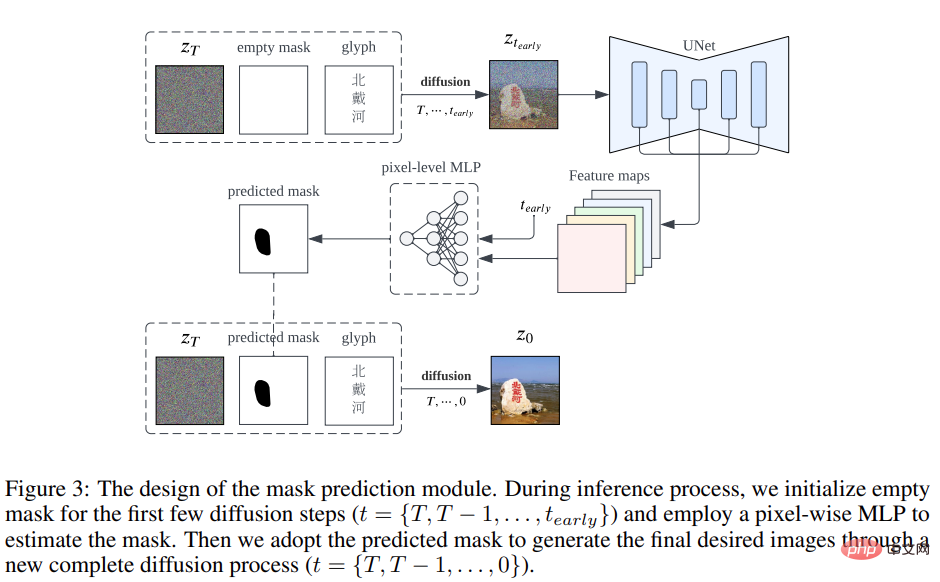
Experiments and results
Since there is no data set specifically used for Chinese character image generation, this study first constructed a The benchmark data set ChineseDrawText was used for qualitative and quantitative evaluation, and then the generation accuracy of several methods (evaluated by the OCR recognition model) was tested and compared on ChineseDrawText.
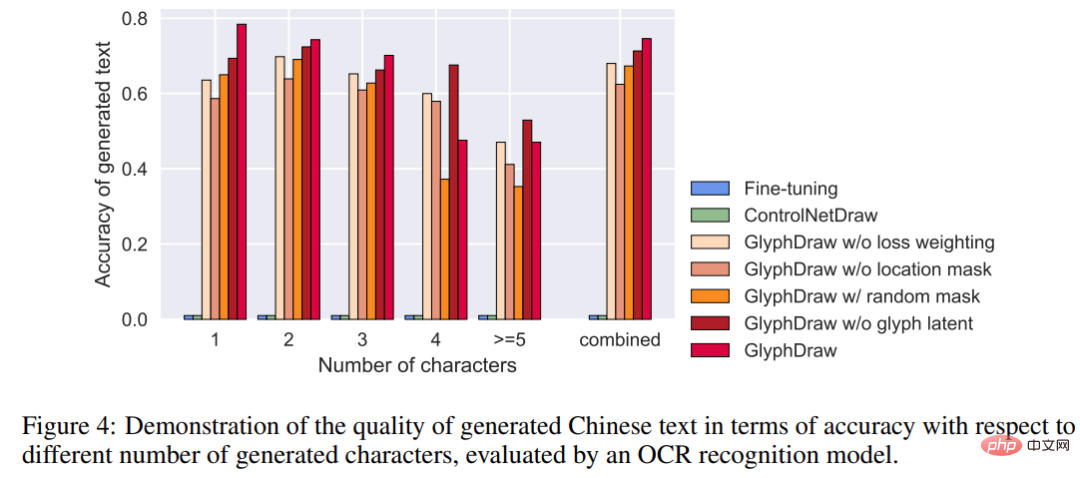
#The GlyphDraw model proposed in this study demonstrates that it achieves an average accuracy of 75% by effectively using auxiliary glyph and position information. Excellent character image generation capabilities. The visual comparison results of several methods are shown in the figure below:
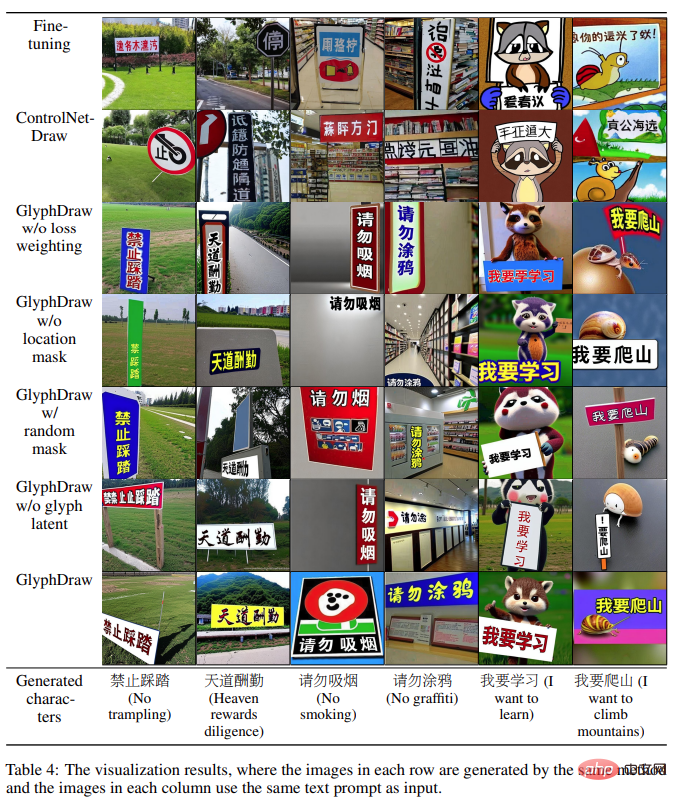
In addition, GlyphDraw can also maintain open domain image synthesis performance by limiting training parameters, The FID of general image synthesis only dropped by 2.3 on MS-COCO FID-10k.


Interested readers can read the original text of the paper to learn more about the research details .
The above is the detailed content of The diffusion model generates images with Chinese characters and outputs emoticons with one click: OPPO and others proposed GlyphDraw. For more information, please follow other related articles on the PHP Chinese website!

Hot AI Tools

Undresser.AI Undress
AI-powered app for creating realistic nude photos

AI Clothes Remover
Online AI tool for removing clothes from photos.

Undress AI Tool
Undress images for free

Clothoff.io
AI clothes remover

Video Face Swap
Swap faces in any video effortlessly with our completely free AI face swap tool!

Hot Article

Hot Tools

Notepad++7.3.1
Easy-to-use and free code editor

SublimeText3 Chinese version
Chinese version, very easy to use

Zend Studio 13.0.1
Powerful PHP integrated development environment

Dreamweaver CS6
Visual web development tools

SublimeText3 Mac version
God-level code editing software (SublimeText3)

Hot Topics
 How to use the chrono library in C?
Apr 28, 2025 pm 10:18 PM
How to use the chrono library in C?
Apr 28, 2025 pm 10:18 PM
Using the chrono library in C can allow you to control time and time intervals more accurately. Let's explore the charm of this library. C's chrono library is part of the standard library, which provides a modern way to deal with time and time intervals. For programmers who have suffered from time.h and ctime, chrono is undoubtedly a boon. It not only improves the readability and maintainability of the code, but also provides higher accuracy and flexibility. Let's start with the basics. The chrono library mainly includes the following key components: std::chrono::system_clock: represents the system clock, used to obtain the current time. std::chron
 Which of the top ten currency trading platforms in the world are the latest version of the top ten currency trading platforms
Apr 28, 2025 pm 08:09 PM
Which of the top ten currency trading platforms in the world are the latest version of the top ten currency trading platforms
Apr 28, 2025 pm 08:09 PM
The top ten cryptocurrency trading platforms in the world include Binance, OKX, Gate.io, Coinbase, Kraken, Huobi Global, Bitfinex, Bittrex, KuCoin and Poloniex, all of which provide a variety of trading methods and powerful security measures.
 Decryption Gate.io Strategy Upgrade: How to Redefine Crypto Asset Management in MeMebox 2.0?
Apr 28, 2025 pm 03:33 PM
Decryption Gate.io Strategy Upgrade: How to Redefine Crypto Asset Management in MeMebox 2.0?
Apr 28, 2025 pm 03:33 PM
MeMebox 2.0 redefines crypto asset management through innovative architecture and performance breakthroughs. 1) It solves three major pain points: asset silos, income decay and paradox of security and convenience. 2) Through intelligent asset hubs, dynamic risk management and return enhancement engines, cross-chain transfer speed, average yield rate and security incident response speed are improved. 3) Provide users with asset visualization, policy automation and governance integration, realizing user value reconstruction. 4) Through ecological collaboration and compliance innovation, the overall effectiveness of the platform has been enhanced. 5) In the future, smart contract insurance pools, forecast market integration and AI-driven asset allocation will be launched to continue to lead the development of the industry.
 Bitcoin price today
Apr 28, 2025 pm 07:39 PM
Bitcoin price today
Apr 28, 2025 pm 07:39 PM
Bitcoin’s price fluctuations today are affected by many factors such as macroeconomics, policies, and market sentiment. Investors need to pay attention to technical and fundamental analysis to make informed decisions.
 What are the top ten virtual currency trading apps? The latest digital currency exchange rankings
Apr 28, 2025 pm 08:03 PM
What are the top ten virtual currency trading apps? The latest digital currency exchange rankings
Apr 28, 2025 pm 08:03 PM
The top ten digital currency exchanges such as Binance, OKX, gate.io have improved their systems, efficient diversified transactions and strict security measures.
 Recommended reliable digital currency trading platforms. Top 10 digital currency exchanges in the world. 2025
Apr 28, 2025 pm 04:30 PM
Recommended reliable digital currency trading platforms. Top 10 digital currency exchanges in the world. 2025
Apr 28, 2025 pm 04:30 PM
Recommended reliable digital currency trading platforms: 1. OKX, 2. Binance, 3. Coinbase, 4. Kraken, 5. Huobi, 6. KuCoin, 7. Bitfinex, 8. Gemini, 9. Bitstamp, 10. Poloniex, these platforms are known for their security, user experience and diverse functions, suitable for users at different levels of digital currency transactions
 How much is Bitcoin worth
Apr 28, 2025 pm 07:42 PM
How much is Bitcoin worth
Apr 28, 2025 pm 07:42 PM
Bitcoin’s price ranges from $20,000 to $30,000. 1. Bitcoin’s price has fluctuated dramatically since 2009, reaching nearly $20,000 in 2017 and nearly $60,000 in 2021. 2. Prices are affected by factors such as market demand, supply, and macroeconomic environment. 3. Get real-time prices through exchanges, mobile apps and websites. 4. Bitcoin price is highly volatile, driven by market sentiment and external factors. 5. It has a certain relationship with traditional financial markets and is affected by global stock markets, the strength of the US dollar, etc. 6. The long-term trend is bullish, but risks need to be assessed with caution.
 What are the top currency trading platforms? The top 10 latest virtual currency exchanges
Apr 28, 2025 pm 08:06 PM
What are the top currency trading platforms? The top 10 latest virtual currency exchanges
Apr 28, 2025 pm 08:06 PM
Currently ranked among the top ten virtual currency exchanges: 1. Binance, 2. OKX, 3. Gate.io, 4. Coin library, 5. Siren, 6. Huobi Global Station, 7. Bybit, 8. Kucoin, 9. Bitcoin, 10. bit stamp.





